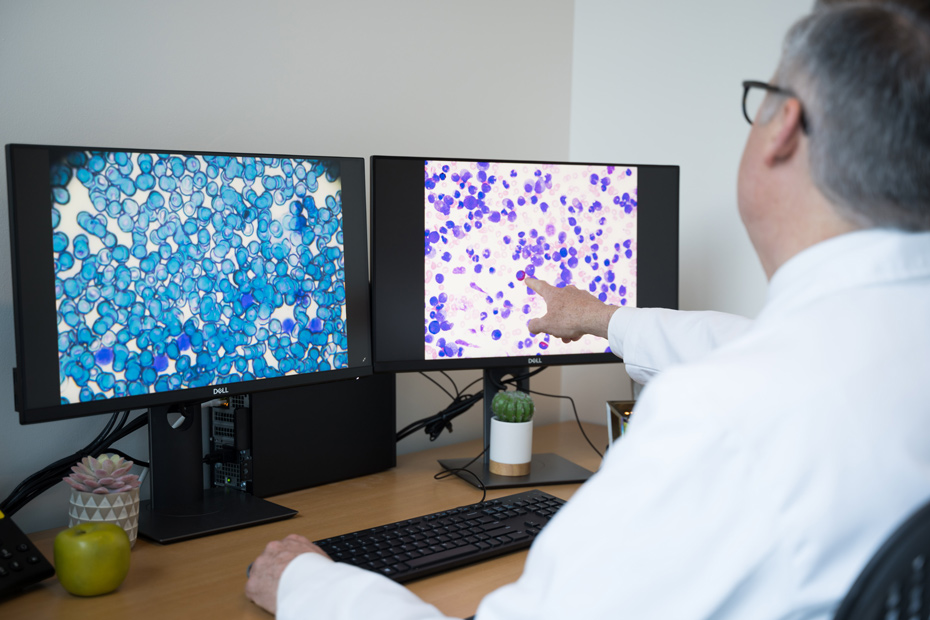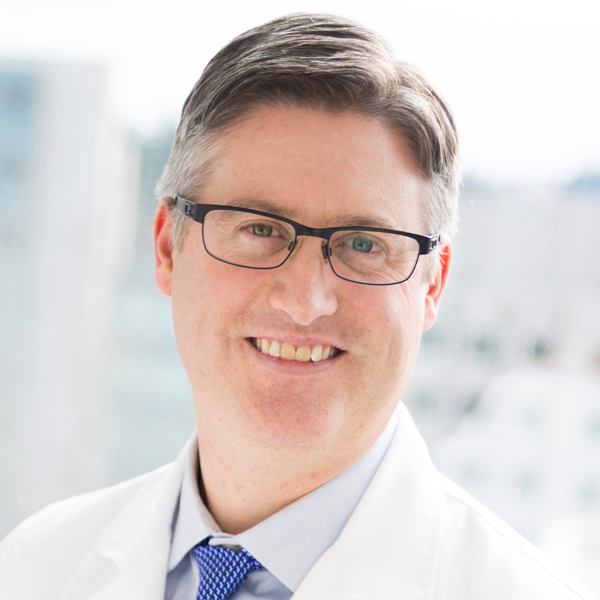Bone Marrow/Stem Cell Transplant Preparation and Treatment

Our large team of specialists provides the highest level of care and experience for bone marrow and stem cell transplants. You’ll find:
- One of the most knowledgeable teams in the United States, with doctors who are on the leading edge of innovation.
- A care team that has done more than 4,500 bone marrow and stem cell transplants.
- A nurse navigator to provide education, resources and coordination of care. This professional will be your advocate throughout treatment.
- Social workers and other experts to help you at every stage of treatment and beyond.
- Treatments such as allogeneic transplantation (using donor cells) that aren’t available anywhere else in Oregon.
- Dozens of clinical trials, offering a chance to try promising therapies that aren’t widely available.
What to expect
Your care team will carefully assess whether a transplant is an option. Your team will discuss risks and benefits with you in detail.
Arranging your first visit
Call 503-494-7999 for an appointment. A coordinator will gather:
- Your name
- Your date of birth or Social Security number
- The reason for your appointment
- The provider you wish to see (you may also see the first-available provider)
Forms and registration
The coordinator may mail you forms to complete for your first visit. You will also need to bring:
- Insurance information
- Your co-payment or prepayment
- A list of your current medications
- Any medical records or scans if a clinic or doctor outside of OHSU is referring you
If you haven’t already, you will need to register as an OHSU patient before your visit.
Nurse navigator
Our transplant nurse navigator serves as your guide, advocate and main contact throughout care. This includes after you transition back to community providers.
Before your first visit:
We strive to reduce as much stress as possible so you feel informed and comfortable when you arrive. The nurse navigator will contact you to:
- Go over what to expect
- Provide information on your general treatment timeline
- Offer information and resources
Gathering records:
The navigator will collect and analyze your medical records and other information. She will share your full story with your care team before the doctors, nurses and others meet you. We want you to feel seen and heard as a person, not an illness.
Throughout treatment:
The nurse navigator:
- Provides education and resources tailored to your needs
- Makes sure you have the knowledge you need for informed decisions
- Helps coordinate appointments, testing and timely access to care
- Helps you set treatment goals, and shares them with your care team and community providers
- Serves as your main contact throughout treatment
- Helps with communication among you, your family and your providers
Your first visit
This visit will take two or more hours. You’ll meet with the nurse navigator and a transplant doctor to discuss treatment options. They will give you a complete overview, including transplant risks and benefits.
We’ll start the process of requesting coverage from your insurance provider, a step that can take months.
The nurse navigator will help you prepare for treatment, and may call on a social worker to offer support for:
- Emotional or social issues
- Housing
- Transportation
- Financial concerns
To protect patients with weakened immune systems, we ask that you not bring small children or wear fragrance. We don’t have magazines, to limit the spread of germs, but we offer free Wi-Fi.

Treatment
Everyone on our team has specialized training and experience in caring for transplant patients.
Evaluation
You’ll have testing to check for any issues that could affect the success of the transplant. This may include:
- Screening for infectious disease
- Blood work to check organ function
- Scans (chest X-ray, CT scan, PET scan, MRI)
- Heart tests (EKG, echocardiogram)
- Bone marrow biopsy (withdrawing a sample for analysis under a microscope)
- Bone scan
If you are receiving a transplant from a donor, we will begin the process of identifying donor cells.
Conditioning
Five to 10 days before a transplant, we will prepare you to receive transplanted cells. Some patients have high doses of chemotherapy and/or total body radiation therapy to kill cancer cells. In other cases, lower doses of chemotherapy and/or total body radiation are used.
Both processes weaken the immune system, making it more likely to accept the transplanted cells.
Transplant
New stem cells will be placed in your bloodstream by IV. The cells collect in bone marrow, where they begin to produce new blood cells after a few weeks.
Recovery and rehabilitation
Monitoring: You’ll stay in our state-of-the-art transplant facility for close monitoring for two to three weeks. The unit has HEPA filtration to reduce germs and the risk of infection. Monitoring is essential because your immune system will be weak, and infections are common. In some cases, you can stay nearby instead of in the hospital.
Testing: We will regularly test your blood to monitor how your body is responding to the transplant. In some cases, you may need a blood transfusion to keep you healthy.
Engraftment: It can take up to four weeks for the transplanted cells to begin to grow and make healthy blood cells.

Support at every step
Our social workers, financial counselors and others will connect you and your family with services and support at OHSU and in the community. Social workers remain available after you transition to follow-up care.
Learn about OHSU support services, and find links to information and resources.
Information for donors
If you are 18 or older, you may be able to offer a lifesaving gift of bone marrow or peripheral blood stem cells. Unrelated donors are considered up to age 44. At OHSU, related donors are considered up to age 67.
Donors:
- Undergo a physical exam and blood tests
- Spend 20-30 hours over four to six weeks to donate
Bone marrow donors: Doctors collect marrow from hipbones with a hollow needle while the donor is under general anesthesia. Some donors spend the night in the hospital.
Peripheral blood stem cell donors: The donor gets a daily injection for five days to increase blood-forming cells. Then blood is withdrawn and put through a machine (apheresis) to collect stem cells for the transplant. The rest of the blood is returned to the donor’s body.
Be The Match, the world’s largest organization that pairs patients and donors, offers information on topics including:
For patients
Call 503-494-7999 to:
- Request an appointment
- Seek a second opinion
- Ask questions
Help and education:
Location
Knight Cancer Institute, South Waterfront
Center for Health & Healing, Building 2
3485 S. Bond Ave.
Portland, OR 97239
Free parking for patients and visitors
Refer a patient
- Refer your patient to OHSU.
- Call 503-494-4567 to seek provider-to-provider advice.
Kids and teens

Support for teens and young adults

Dr. Brandon Hayes-Lattin leads OHSU’s Adolescent and Young Adult Oncology Program. It’s the only program in Oregon for people diagnosed with cancer from ages 15 to 39. You’ll find support, a chance to interact with peers, and more.
Read more
Learn more about OHSU Knight Cancer Institute treatments: